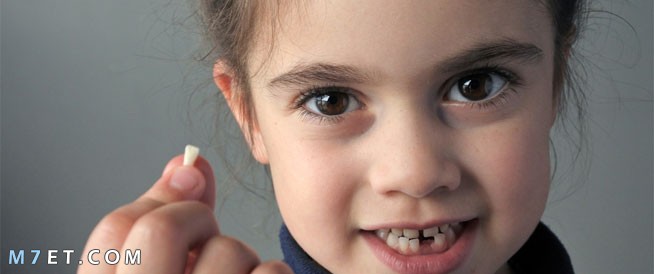
Delayed teething in children across a circumference site, We care a lot about our little ones and follow their growth very carefully and eagerly await the appearance of their first teeth, but when the baby’s teeth are late, you worry now and are looking for a direct cause for this problem. Therefore, through this article, we will explain to you in detail the reasons for the delay in teething and when do the teeth begin to appear?
When do baby teeth begin to appear?

- Parents ask about the appropriate time for the emergence of teeth for their children and become anxious and confused as a result, but the children’s teeth are already present at the birth of the child, but they are hidden inside the gums and appear with the age of the child
- The appearance of the teeth varies from one child to another in the time of appearance and also differs in terms of the order of their appearance.
- The first teeth often appear when the child completes the sixth month, but in many cases the appearance of the teeth is delayed until the child completes his first year
- When the child gets older and reaches his third year, he will have about 20 years of age appearing in his mouth.
See also: raising a newborn baby
Causes of delayed teething in children
There are many important reasons for delaying teething in children, the most important of which are the following:
Genetic factors
- Genetic factors are one of the causes of delayed teething in children. If your family has a history of disease and dental problems, your child may be affected by these factors and the development of teeth will be delayed.
- Also genetic factors appear in the form of abnormalities in the teeth and not growing properly.
- The genetic factor negatively or positively affects the formation of the shape of the mouth and teeth. If a member of your family has a problem with the formation of teeth, perhaps your child has these factors and is affected by them.
- Gum and teeth problems are affected by genetic factors by no more than 30% because they are among the weak areas in the body and are at risk of developing cavities.
Malnutrition
- Proper nutrition is one of the main factors that help in the development of children’s teeth on time. A child who receives the appropriate nutrition will not have any problems in the growth of years and teeth.
- The nutrition of the child from the beginning of his birth until he reaches the sixth month depends on breastfeeding, as the mother’s milk contains calcium, magnesium, and some minerals and nutrients that are beneficial to the child’s body and help in its proper growth.
- And from the beginning of the seventh month, we add some simple meals that contain calcium and iron to help the child’s body and its growth and the emergence of teeth.
- If the child does not get all the nutrients and minerals he needs in this period of his life, it is expected that he will have some problems in the emergence of teeth and delay in their growth in addition to tooth decay resulting from poor nutrition.
growth hormone deficiency
- Growth hormone deficiency is the insufficiency of the thyroid gland and its inactivity and lack of secretion of the hormones that the body needs, which negatively affects the growth of the child and the delay in the emergence of teeth and also the delay in walking and speech, and some problems related to growth appear, such as short stature, weak muscles and weight gain.
Premature birth
- Premature birth is one of the important reasons that affect the health of the infant and leads to many problems due to its low weight and exposes it to some health problems, including delayed teething and the emergence of problems in the enamel and gums.
You may also read: Dramelin for the treatment of cough in children
Treating delayed teething in children
There are some effective methods that help in the treatment of delayed teething, and the most important of these methods are:
- Expose the child to the sun, especially during the morning, to benefit from it.
- Ensure that the child is nourished and supplied with vitamins, minerals and calcium.
- Massage the baby’s gums and clean them with wet gauze.
- Clean the baby’s tongue after feeding.
- Do not use fluoride toothpaste until the child reaches the age of two years.
- Continuously giving the child vitamin D from birth, four drops daily.
- Avoid giving the child sweets and drinks that contain high levels of sugar.
Disadvantages of delayed tooth eruption for children
Delayed teething of children results in many diseases, including:
- The inability to chew food properly, which affects the integrity of the digestive system and makes the child suffer from difficulty in digestion.
- Tooth decay is one of the complications of delayed teething.
- Tooth distortion and improper growth.
When should you consult a doctor?

A doctor should be consulted if the child reaches his first year and does not have teeth, he must make sure that he does not suffer from a deficiency of calcium and vitamin D.
- Conducting some medical tests to ensure that the child does not suffer from hypothyroidism or pituitary insufficiency.
- If the child reaches a year and a half and the teeth do not appear, who should resort to the dentist to obtain the necessary medical assistance.
Signs of teething in children
There are some symptoms that accompany the period of teething, and the most important of these symptoms are
- Crying constantly
- rise in temperature
- Gum swelling and redness
- A change in the child’s mood.
- Drooling a lot
- Desire to cut and organ
- Some sleep disturbances.
- diarrhea.
- Redness of the cheeks.
You may be interested to know: The best medicine for anemia in children
At the end of the article, we will explain to you what are the causes of delayed teething in children, what is the appropriate time for its appearance, how to treat this problem, and when to resort to a doctor?






